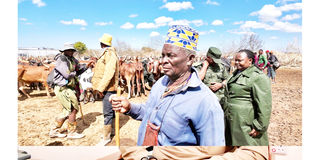Prime
Tanzania national parks authority denies human rights abuse claims in Ruaha

Livestock keepers and Tanapa officials during the handover of over 500 of cattle recently seized in Ruaha National Park
What you need to know:
- The human rights abuse claims come amid broader scrutiny from global human rights organisations, which recently accused Tanapa of killing two villagers within disputed park boundaries
Mbeya. The Tanzania National Parks Authority (Tanapa) has rejected claims by international NGOs alleging human rights violations by park rangers during a recent operation in Ruaha National Park, describing the reports as misleading and exaggerated.
The incident in question occurred on May 7, 2025, during a routine patrol by a four-ranger team from the Usangu West unit in Ruaha.
According to Southern Zone Commander, Senior Assistant Conservation Commissioner, Godwell Ole Meing’ataki, the rangers seized 1,113 animals found grazing illegally in the Mjenje area of the park.
Upon spotting the rangers, around ten herders fled, leaving the livestock behind.
The rangers began escorting the animals to Ukwaheri post, approximately eight kilometres away.
However, around midnight, the patrol was ambushed by an unidentified group armed with traditional weapons, including spears and arrows, in an attempt to retrieve the seized livestock.
“The rangers fired warning shots into the air to disperse the attackers and managed to deliver the livestock safely to the post within an hour,” Mr Meing’ataki said.
On the morning of May 8, the Officer Commanding District (OCD) in Mbarali reported that a man from Iyala village had died as a result of the confrontation.
A joint team comprising police officers, park authorities, and a medical doctor was dispatched to investigate the circumstances surrounding the death.
Traditional weapons and three injured cattle were recovered from the ambush site.
Authorities have taken the rangers into police custody as part of the ongoing investigation.
Officials also inspected the livestock held at Ukwaheri as part of the inquiry.
The incident comes amid broader scrutiny from global human rights organisations, which recently accused Tanapa of killing two villagers within disputed park boundaries.
The NGOs further linked the alleged abuses to the World Bank-funded Resilient Natural Resource Management for Tourism and Growth (REGROW) project, claiming it had led to increased ranger activity.
Tanapa has strongly denied these allegations, labelling them part of a smear campaign against Tanzania’s conservation efforts.
Speaking at a livestock handover ceremony held to ease tensions with herding communities, Tanapa’s Assistant Conservation Commissioner for Corporate Communication, Ms Catherine Mbena, criticised the NGOs’ portrayal of events.
“This occasion reflects our commitment to resolving conflicts amicably with communities,” she told the crowd.
Ms Mbena said Tanapa does not condone human rights violations and is fully cooperating with the ongoing investigation.
“Our rangers operate under challenging conditions to protect a global natural heritage. Criticising them without context is reckless,” she said.
She also dismissed claims that the REGROW project had created or intensified ranger enforcement in Ruaha, saying that Tanapa has managed the park—one of the largest in Africa—for more than 60 years.
“It is absurd to suggest that Ruaha’s rangers only came into existence after REGROW. If we were as brutal as claimed, millions of trespassers would have died, which is simply not true,” Ms Mbena added.
The incident has drawn attention to long-standing environmental pressures in the region.
In 2003, the integration of the Ihefu Valley and Usangu Plains into Ruaha National Park was prompted by declining water flows in the Great Ruaha River, caused by unsustainable farming and herding practices and rising population pressures.
The river, which powers the Mtera, Kidatu, and Nyerere dams, is responsible for two-thirds of Tanzania’s electricity generation.
According to the Tanzania Wildlife Research Institute (Tawiri), declining water levels have severely impacted wildlife in the park, particularly buffalo populations.
While the indigenous Sangu pastoralists historically coexisted with the ecosystem, increased migration into the Mbarali area has placed unsustainable pressure on resources.
The district, which can support around 60,000 cattle, now hosts over 300,000 livestock.
Experts warn that water demands from such intensive livestock farming are unsustainable.
Producing a single litre of milk requires 2,000 litres of water, while a kilogram of beef needs up to 22,000 litres—quantities barely sufficient to meet household needs.
Tanapa has reaffirmed its commitment to ethical and sustainable conservation, urging a more balanced and evidence-based discourse that accounts for both park protection and community livelihoods.





